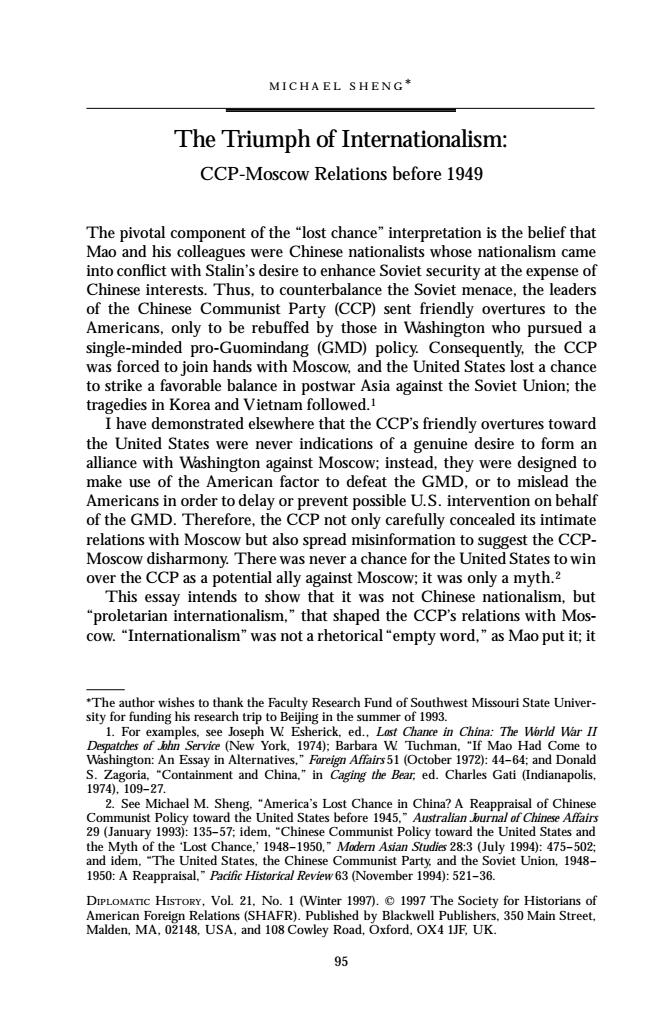正在加载图片...

MICHAEL SHENG* The Triumph of Internationalism: CCP-Moscow Relations before 1949 The pivotal component of the "lost chance"interpretation is the belief that Mao and his colleagues were Chinese nationalists whose nationalism came into conflict with Stalin's desire to enhance Soviet security at the expense of Chinese interests.Thus,to counterbalance the Soviet menace,the leaders of the Chinese Communist Party (CCP)sent friendly overtures to the Americans,only to be rebuffed by those in Washington who pursued a single-minded pro-Guomindang (GMD)policy.Consequently,the CCP was forced to join hands with Moscow,and the United States lost a chance to strike a favorable balance in postwar Asia against the Soviet Union;the tragedies in Korea and Vietnam followed.1 I have demonstrated elsewhere that the CCP's friendly overtures toward the United States were never indications of a genuine desire to form an alliance with Washington against Moscow;instead,they were designed to make use of the American factor to defeat the GMD,or to mislead the Americans in order to delay or prevent possible U.S.intervention on behalf of the GMD.Therefore,the CCP not only carefully concealed its intimate relations with Moscow but also spread misinformation to suggest the CCP- Moscow disharmony.There was never a chance for the United States to win over the CCP as a potential ally against Moscow;it was only a myth.2 This essay intends to show that it was not Chinese nationalism,but "proletarian internationalism,"that shaped the CCP's relations with Mos- cow."Internationalism"was not a rhetorical"empty word,"as Mao put it;it The author wishes to thank the Faculty Research Fund of Southwest Missouri State Univer- sity for funding his research trip to Beijing in the summer of 1993. 1.For examples,see Joseph W.Esherick,ed..Lost Chance in China:The World War II Despatches of bhn Service (New York,1974):Barbara W Tuchman,"If Mao Had Come to Washington:An Essay in Alternatives,"Foreign Affairs51 (October 1972):44-64;and Donald S.Zagoria,"Containment and China."in Caging the Bear.ed.Charles Gati (Indianapolis. 1974),109-27. 2.See Michael M.Sheng."America's Lost Chance in China?A Reappraisal of Chinese Communist Policy toward the United States before 1945,"Australian.burnal of Chinese Affairs 29(January 1993):135-57;idem,"Chinese Communist Policy toward the United States and the Myth of the 'Lost Chance,'1948-1950."Modern Asian Studies 28:3 (July 1994):475-502: and idem."The United States,the Chinese Communist Party.and the Soviet Union,1948- 1950:A Reappraisal,"Pacific Historical Review 63(November 1994):521-36. DIPLOMATIC HIsToRY,Vol.21.No.1 (Winter 1997).1997 The Society for Historians of American Foreign Relations(SHAFR).Published by Blackwell Publishers,350 Main Street, Malden,MA,02148.USA,and 108 Cowley Road,Oxford,OX4 1JF,UK. 95M I C H A E L S H E N G * The Triumph of Internationalism: CCP-Moscow Relations before 1949 The pivotal component of the “lost chance” interpretation is the belief that Mao and his colleagues were Chinese nationalists whose nationalism came into conflict with Stalin’s desire to enhance Soviet security at the expense of Chinese interests. Thus, to counterbalance the Soviet menace, the leaders of the Chinese Communist Party (CCP) sent friendly overtures to the Americans, only to be rebuffed by those in Washington who pursued a single-minded pro-Guomindang (GMD) policy. Consequently, the CCP was forced to join hands with Moscow, and the United States lost a chance to strike a favorable balance in postwar Asia against the Soviet Union; the tragedies in Korea and Vietnam followed.1 I have demonstrated elsewhere that the CCP’s friendly overtures toward the United States were never indications of a genuine desire to form an alliance with Washington against Moscow; instead, they were designed to make use of the American factor to defeat the GMD, or to mislead the Americans in order to delay or prevent possible U.S. intervention on behalf of the GMD. Therefore, the CCP not only carefully concealed its intimate relations with Moscow but also spread misinformation to suggest the CCPMoscow disharmony. There was never a chance for the United States to win over the CCP as a potential ally against Moscow; it was only a myth.2 This essay intends to show that it was not Chinese nationalism, but “proletarian internationalism,” that shaped the CCP’s relations with Moscow. “Internationalism” was not a rhetorical “empty word,” as Mao put it; it *The author wishes to thank the Faculty Research Fund of Southwest Missouri State University for funding his research trip to Beijing in the summer of 1993. 1. For examples, see Joseph W. Esherick, ed., Lost Chance in China: The World War II Despatches of John Service (New York, 1974); Barbara W. Tuchman, “If Mao Had Come to Washington: An Essay in Alternatives,” Foreign Affairs 51 (October 1972): 44–64; and Donald S. Zagoria, “Containment and China,” in Caging the Bear, ed. Charles Gati (Indianapolis, 1974), 109–27. 2. See Michael M. Sheng, “America’s Lost Chance in China? A Reappraisal of Chinese Communist Policy toward the United States before 1945,” Australian Journal of Chinese Affairs 29 (January 1993): 135–57; idem, “Chinese Communist Policy toward the United States and the Myth of the ‘Lost Chance,’ 1948–1950,” Modern Asian Studies 28:3 (July 1994): 475–502; and idem, “The United States, the Chinese Communist Party, and the Soviet Union, 1948– 1950: A Reappraisal,” Pacific Historical Review 63 (November 1994): 521–36. DIPLOMATIC HISTORY, Vol. 21, No. 1 (Winter 1997). q 1997 The Society for Historians of American Foreign Relations (SHAFR). Published by Blackwell Publishers, 350 Main Street, Malden, MA, 02148, USA, and 108 Cowley Road, Oxford, OX4 1JF, UK. 95